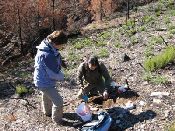| PRACTICE |
Prevention and restoration actions to combat desertification. An integrated assessment |
| Time span: |
2009-2012 |
| Description: |
The general objective of PRACTICE is to link S & T advances and traditional knowledge on prevention and restoration practices to combat desertification with sound implementation, learning and adaptive management, knowledge sharing, and dissemination of best practices. Specific objectives are:
- To create an international platform of long-term monitoring sites for assessing and investigating practices to combat desertification
- To develop integrated evaluation tools to assess the cost-effectiveness of practices to combat desertification, taking into account changes in both biophysical and socio-economic properties, by synergistically exploiting the recent advances on assessment and evaluation methodologies and approaches
- To assess prevention and restoration practices to combat desertification for croplands, rangelands and woodlands, considering the impacts on socio-economic status, soil functions, biodiversity, and ecosystem services
- To identify and document best practices to combat desertification considering multiple purposes at different spatial (local to global) scales, and to establish cost-effective thresholds for the various management alternatives
- To develop education material and translational science strategies, and implement innovative participatory approaches to link science to society, to share and transfer evaluation methods and best practices, addressing and involving stakeholders at all levels, from farmers to local organisations, to national and international bodies.
|
| Countries: |
Partners in Spain, Germany, United Kingdom, Italy, Chile, China, Portugal, South Aftica, Mexico, Israel, Greece
|
Website:
|
http://80.24.165.149/drupal |
|



